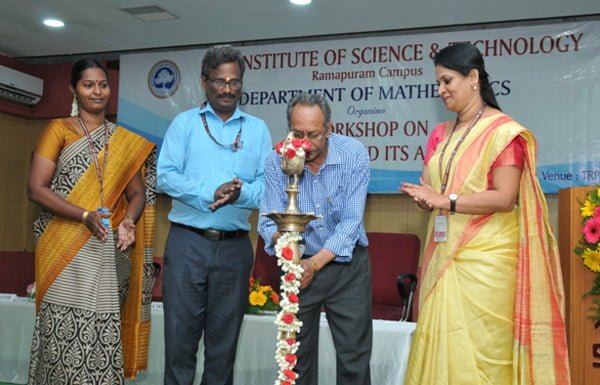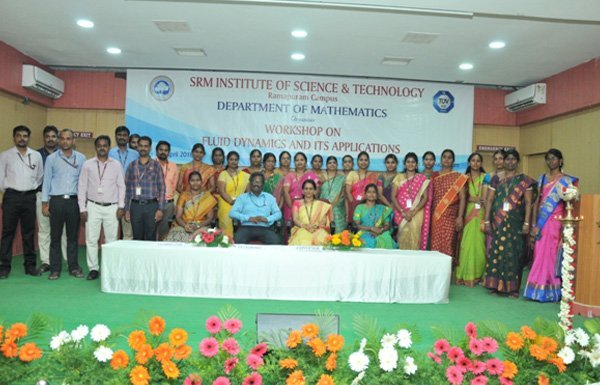Mathematics is playing an important role in the physical and biological sciences, provoking a blurring of boundaries between scientific disciplines and a resurgence of interest in the modern as well as the classical techniques of applied mathematics
Fluid dynamics, the behavior of liquids and gases, is a field of broad impact in physics, engineering, oceanography, meteorology etc., yet demands full understanding of fluency in higher Mathematics. Fluid dynamics has a wide range of applications, including calculating forces and moments on aircraft, determining the mass flow rate of petroleum through pipelines, predicting weather patterns, understanding nebulae in interstellar space, modeling fission weapon detonation, biomedical research and medical diagnostics etc.
Department of Mathematics, SRM Institute of Science and Technology, Ramapuram organized one day workshop on “Fluid Dynamics & Its Applications” on 12th April, 2018 at TRP auditorium, Ramapuram campus. The purpose of this workshop is to bring together experts and young researchers and provide a platform for discussion on recent advances and developments in Fluid Dynamics and its Applications. More than 50 participants from Various Educational Institutions participated in this Workshop.
The day began with the inaugural function by invocation and lighting the kuthuvizhakku. Dr. Shakeela Sathish, Head of the Department of Mathematics and Convener of the workshop welcomed the gathering and emphasized about the workshop. Dr. G.S.V.L. Narasimham, Chief Research Scientist, Indian Institute of Science, Bangalore, in his inaugural address, said that Fluid Dynamics is rich with vast concepts of it. Without Mathematical background it is not possible to study Fluid Dynamics.
Dr. K.C. Udaiyakumar, Vice Principal (Academic), delivered the Presidential address. He praised the Department of Mathematics for taking efforts in conducting a workshop on Application of Mathematics in Fluid Dynamics. He further said that critical thinking is required when it comes to research.
Inaugural session was followed by invited talks by eminent Mathematicians. The first invited lecture of the day was given by Dr. G.S.V.L. Narasimham on “An Overview of CFD Techniques”. He explained about CFD which is used for formulating and solving problems involving fluid flow, heat transfer, mass transfer, combustion etc. Limitations of CFD, steps for solving a problem of CFD, vorticity- velocity formulation were explained. He then elucidated about the types of meshes through diagrammatic examples. Algorithms for primitive variable formulations, Convective differencing schemes have been discussed.
Dr. Y.V.S.S Sanyasiraju, Professor, Department of Mathematics, IIT Madras delivered a invited talk on “True upwinding using RBF based meshless schemes”. He discussed about Polynomial Interpolation where he said Radial basis function came as a replacement to Lagrangian Interpolation which can’t be used to surfaces. RBF as an interpolation tool was explained. Finally, RBF as a collocation to solve PDE’s, asymmetric collocation, convection- diffusion equation were explicated.
The next invited lecture was given by Dr. R. Usha, Professor, Department of Mathematics, IIT Madras on “Spin Coating”. She explained thin film through the example of thin tear film over the cornea which prevents dry eye syndrome. She discussed about spin coating for application of thin films. Important factor in spin coating- Repeatability, spin coating process, static and dynamic dispense, acceleration and drying step, spin speed, film thickness, balance between centrifugal force and viscous resistance were all explained effectively. Applications of spin coating, theoretical and computational model of spin coating, numerical solution for infinite and finite acceleration and acceleration phase of the spinning disc were interpreted.
Dr. Satyajit Roy, Professor, Department of Mathematics, IIT Madras, gave the invited lecture on the topic “Non – uniform Mass transfer and inverse problems in Boundary Layer Flows”. Topics such as temperature dependent viscosity and Prandtl number, uniform and non- uniform mass transfer through slot, potential flow velocity, Varga’s algorithm were discussed. Flow model, potential flow velocity and inverse problem in boundary layer flows were explained.
The intensive exposure to the subject, through presentations and discussions led by multiple experts, renewed our motivation to pursue higher productivity and fulfillment of professional and academic goals. Mrs. R. Vijayalakshmi, Coordinator, proposed the vote of thanks. The workshop was a great success with Faculty members from various institutions benefited through enriching lectures of the invited speakers.









